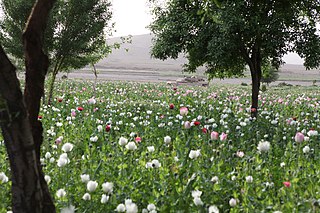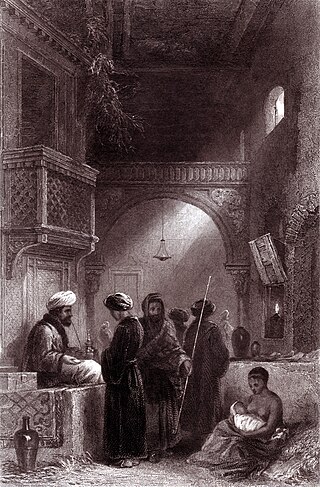Related Research Articles

Opium is dried latex obtained from the seed capsules of the opium poppy Papaver somniferum. Approximately 12 percent of opium is made up of the analgesic alkaloid morphine, which is processed chemically to produce heroin and other synthetic opioids for medicinal use and for the illegal drug trade. The latex also contains the closely related opiates codeine and thebaine, and non-analgesic alkaloids such as papaverine and noscapine. The traditional, labor-intensive method of obtaining the latex is to scratch ("score") the immature seed pods (fruits) by hand; the latex leaks out and dries to a sticky yellowish residue that is later scraped off and dehydrated. The word meconium historically referred to related, weaker preparations made from other parts of the opium poppy or different species of poppies.

Papaver somniferum, commonly known as the opium poppy or breadseed poppy, is a species of flowering plant in the family Papaveraceae. It is the species of plant from which both opium and poppy seeds are derived and is also a valuable ornamental plant grown in gardens. Its native range was east of the Mediterranean Sea, but now is obscured by ancient introductions and cultivation, being naturalized across much of Europe and Asia.

The Single Convention on Narcotic Drugs, 1961 is an international treaty that controls activities of specific narcotic drugs and lays down a system of regulations for their medical and scientific uses; it also establishes the International Narcotics Control Board.
The International Narcotics Control Board (INCB) is an independent treaty body, one of the four treaty-mandated bodies under international drug control law.
The 1972 Protocol amending the Single Convention on Narcotic Drugs was a protocol that made several changes to the Single Convention on Narcotic Drugs. It highlighted the need for treatment and rehabilitation of drug addicts, instructing parties to take "all practicable measures for the prevention of abuse of psychotropic substances and for the early identification, treatment, education, after-care, rehabilitation, and social reintegration of the persons involved". It also expanded the International Narcotics Control Board from 11 members to 13 members.
The Golden Crescent is the name given to one of Asia's two principal areas of illicit opium production. Located at the crossroads of Central, South, and West Asia, this space covers the mountainous peripheries of Afghanistan and Pakistan, extending into eastern Iran.
Opium replacement or opium substitution refers to the process of substituting opium poppy cash crops with non-narcotic alternatives.

The Golden Triangle is a large, mountainous region of approximately 200,000 km2 (77,000 sq mi) in northeastern Myanmar, northwestern Thailand and northern Laos, centered on the confluence of the Ruak and Mekong rivers. The name "Golden Triangle" was coined by Marshall Green, a U.S. State Department official, in 1971 in a press conference on the opium trade. Today, the Thai side of the river confluence, Sop Ruak, has become a tourist attraction, with an Opium Museum, a Hall of Opium, and a Golden Triangle Park, and no opium cultivation.

Afghanistan has long had a history of opium poppy cultivation and harvest. As of 2021, Afghanistan's harvest produces more than 90% of illicit heroin globally, and more than 95% of the European supply. More land is used for opium in Afghanistan than is used for coca cultivation in Latin America. The country has been the world's leading illicit drug producer since 2001. In 2007, 93% of the non-pharmaceutical-grade opiates on the world market originated in Afghanistan. By 2019 Afghanistan still produced about 84% of the world market. This amounts to an export value of about US $4 billion, with a quarter being earned by opium farmers and the rest going to district officials, insurgents, warlords, and drug traffickers. In the seven years (1994–2000) prior to a Taliban opium ban, the Afghan farmers' share of gross income from opium was divided among 200,000 families.
Opium licensing is a policy instrument used to counter illegal drug cultivation and production. It has been used in countries such as Turkey and India to curb illegal opium production. The main mechanism used under opium licensing is a shift from cultivation and/or production for the illegal market towards legal uses such as the production of essential medicines such as morphine and codeine.
The illegal drug trade in China is influenced by factors such as history, location, size, population, and current economic conditions. China has one-sixth of the world's population and a large and expanding economy. China's large land mass, close proximity to the Golden Triangle, Golden Crescent, and numerous coastal cities with large and modern port facilities make it an attractive transit center for drug traffickers. Opium has played an important role in the country's history since before the First and Second Opium Wars in the mid-19th century.
This article deals with activities of the U.S. Central Intelligence Agency related to transnational crime, including the illicit drug trade.

Crime in Afghanistan is present in various forms, and includes the following: corruption, contract killings or assassinations, bombings, kidnapping, drug trafficking, money laundering, black marketeering, and ordinary crimes such as theft and assault.
The Government Opium and Alkaloid Factories (GOAF) is an Indian government-owned organisation. Its headquarter is located in New Delhi. The overall supervision of the organisation comes under the purview of Department of Revenue, Ministry of Finance. There are two factories under this organisation - Government Opium and Alkaloid Works, Ghazipur (U.P.) and Government Opium and Alkaloid Works, Neemuch (M.P.).
The International Council on Security and Development (ICOS) is an international think tank that focuses on Afghanistan and other conflict zones all over the world such as Iraq, Syria and Somalia. ICOS is a project of the Network of European Foundations' The Mercator Fund. The organization was originally named the Senlis Council in 2002 but later in 2013 renamed as the International Council on Security and Development to reflect the interest and activities of the organization.

Mohammed Daud Daud, also known as General Daud Daud, an ethnic Tajik, was the police chief in northern Afghanistan and the commander of the 303 Pamir Corps. He was an opponent of the Afghan Taliban.
Legal cultivation of opium for medicinal purposes is carried out in India, only in selected areas, under free licensing conditions. India is the world's largest manufacturer of legal opium for the pharmaceutical industry according to the CIA World Factbook. India is one among 12 countries in world where legal cultivation for medical use is permissible within the ambit of United Nations, Single Convention on Narcotic Drugs 1961. In India legal cultivation is done primarily in Madhya Pradesh, Rajasthan and Uttar Pradesh. Despite producing poppy for opium production India depends heavily on imports to meet need of Poppy seed for edible purposes and domestic Codeine demand for medical purposes . Opium is heavily imported from its top producing nations like Afghanistan. There is also an account of Opium black marketing in India.

Poppy straw is derived from opium poppies that are harvested when fully mature and dried by mechanical means. Opium poppy straw is what remains after the seed pods have been harvested - that is, the dried stalks, stem and leaves of poppies grown for their seeds. The field-dried leaves, stalk, and seed pod are then used in commercial manufacture of morphine or other poppy-alkaloid derived drugs, by first processing the material, separating the seeds, and then making concentrate of poppy straw where no extraction using the traditional methods of latex extraction has been made. The straw was originally considered an agricultural by-product of the mechanised poppy seed harvest, which was primarily grown for its edible and oil-producing seed. This changed in 1927 when János Kabay developed a chemical process to extract morphine from the crushed capsule. Concentrated poppy straw, consisting mainly of the crushed capsule without the seeds, soon became a valuable source of morphine. Today, concentrate of poppy straw is a major source of many opiates and other alkaloids. It is the source of 90% of the world supply of legal morphine and in some countries it also is a source of illegal morphine, which could be processed into illegal heroin.

Opium production in Myanmar has historically been a major contributor to the country's gross domestic product (GDP). Myanmar is the world's largest producer of opium, producing some 25% of the world's opium, and forms part of the Golden Triangle. The opium industry was a monopoly during colonial times and has since been illegally tolerated, encouraged and informally taxed by corrupt officials in the Tatmadaw, Myanmar Police Force and rebel fighters, primarily as the basis for heroin manufacture. While opium poppy cultivation in Myanmar had declined year-on-year since 2015, cultivation area increased by 33% totalling 40,100 hectares alongside an 88% increase in yield potential to 790 metric tonnes in 2022 according to latest data from the United Nations Office on Drugs and Crime (UNODC) Myanmar Opium Survey 2022. With that said, the United Nations Office on Drugs and Crime (UNODC) has also warned that opium production in Myanmar may rise again if the economic crunch brought on by COVID-19 and the country's February 1 military coup persists, with significant public health and security consequences for much of Asia.

The illegal drug trade in Turkey has played a significant role in its history. Turkish authorities claim that Drug trafficking has provided substantial revenue for illegal groups such as the Kurdistan Workers' Party (PKK), particularly through marijuana cultivation in south-eastern Turkey, and the 1996 Susurluk scandal showed substantial involvement in drug trafficking on the part of the Turkish deep state. The French Connection heroin trade in the 1960s and 70s was based on poppies grown in Turkey.
References
- ↑ "The European Union and Afghanistan" Archived September 27, 2007, at the Wayback Machine
- ↑ "Poppy for Medicine". The Senlis Council. June 2007. Archived from the original on September 28, 2007.
- ↑ "A Political History of Poppy Licensing in Turkey"